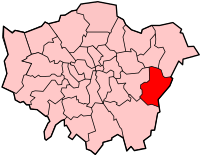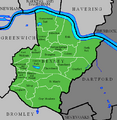London Borough of Bexley facts for kids
| London Borough of Bexley | |
 Shown within Greater London |
|
| Official website | LB Bexley |
Quick facts for kids Geography |
|
|---|---|
| Status | London borough |
| Area — Total |
Ranked 289th 60.56 km² |
| ONS code | 00AD |
| Admin HQ | Broadway, Bexleyheath |
| Demographics | |
| Population — Total (2005 est.) — Density |
Ranked 55th (of 354) 220,300 3,638 / km² |
| Ethnicity | 91.4% White 3.4% South Asian 2.9% African-Caribbean |
| Politics | |
| Leadership | Leader & Cabinet |
| Mayor | Cllr Brian Beckwith |
| Executive | Conservative |
| MPs | John Austin Derek Conway David Evennett |
| London Assembly — Member |
Bexley and Bromley Bob Neill |
The London Borough of Bexley is a special part of London called a borough. It is located in the south-east part of London, on the edge of the city. Bexley is known for its many green spaces, historic buildings, and a mix of quiet neighborhoods and busy town centers. It offers a blend of city life and natural beauty.
| Greater London • London • City of London | |
|---|---|
|
London Boroughs: Barking and Dagenham • Barnet • Bexley • Brent • Bromley • Camden • Croydon • Ealing • Enfield • Greenwich • Hackney • Hammersmith and Fulham • Haringey • Harrow • Havering • Hillingdon • Hounslow • Islington • Kensington and Chelsea • Kingston • Lambeth • Lewisham • Merton • Newham • Redbridge • Richmond • Southwark • Sutton • Tower Hamlets • Waltham Forest • Wandsworth • Westminster |
|
Contents
What is the London Borough of Bexley?
Bexley is one of the 32 boroughs that make up Greater London. It was created in 1965 when several smaller areas joined together. These areas included Bexley, Erith, Crayford, and Sidcup. The borough is named after the historic town of Bexley.
It covers an area of about 60.56 square kilometers (23.38 square miles). The River Thames forms its northern border. This means parts of Bexley have lovely riverside views. The borough is a popular place for families.
A Look at Bexley's History
The area that is now Bexley has a long history. People have lived here for thousands of years. There are signs of ancient settlements, including Roman roads. Over time, it grew from small villages into the busy area it is today.
Many of Bexley's towns, like Bexleyheath and Sidcup, grew quickly in the 19th and 20th centuries. This happened as London expanded. People moved out of the crowded city center to live in quieter, greener places. The arrival of railways helped connect Bexley to central London.
Exploring Bexley's Green Spaces and Landmarks
Bexley is often called "the Garden Borough" because it has so many parks and open areas. These green spaces are perfect for walks, sports, and enjoying nature. The borough also has some interesting historic buildings.
Parks and Green Spaces
- Danson Park: This is one of Bexley's largest parks. It has a beautiful lake where you can go boating. There are also sports pitches, a playground, and a historic house called Danson House.
- Foots Cray Meadows: This is a large area of parkland along the River Cray. It's a great place for wildlife spotting. You can see different birds and plants here.
- Lesnes Abbey Woods: These woods are home to the ruins of Lesnes Abbey. The abbey was founded in 1178. It's a peaceful place to explore history and nature together.
Famous Buildings
- Hall Place: This is a stunning historic house with beautiful gardens. It was built in the 16th century. Today, it hosts events and has art exhibitions. You can also enjoy its lovely gardens.
- Bexley Civic Offices: This modern building is where the local council works. It's located in Bexleyheath. It's an important place for the borough's daily operations.
- St Mary the Virgin Church: Located in Bexley village, this ancient church has a distinctive spire. It has been a central part of the community for centuries.
How Bexley is Governed
Like all London boroughs, Bexley has its own local government. This is called the Bexley London Borough Council. The council is made up of elected councillors. These councillors are chosen by the people who live in Bexley.
The council makes decisions about local services. These services include things like schools, parks, libraries, and waste collection. They work to improve the lives of everyone in the borough. The leader of the council and their team manage these services.
Images for kids
-
Hall Place, with 16th- (left) and 17th-century wings.
See also
 In Spanish: Municipio de Bexley (Londres) para niños
In Spanish: Municipio de Bexley (Londres) para niños
 | Tommie Smith |
 | Simone Manuel |
 | Shani Davis |
 | Simone Biles |
 | Alice Coachman |






